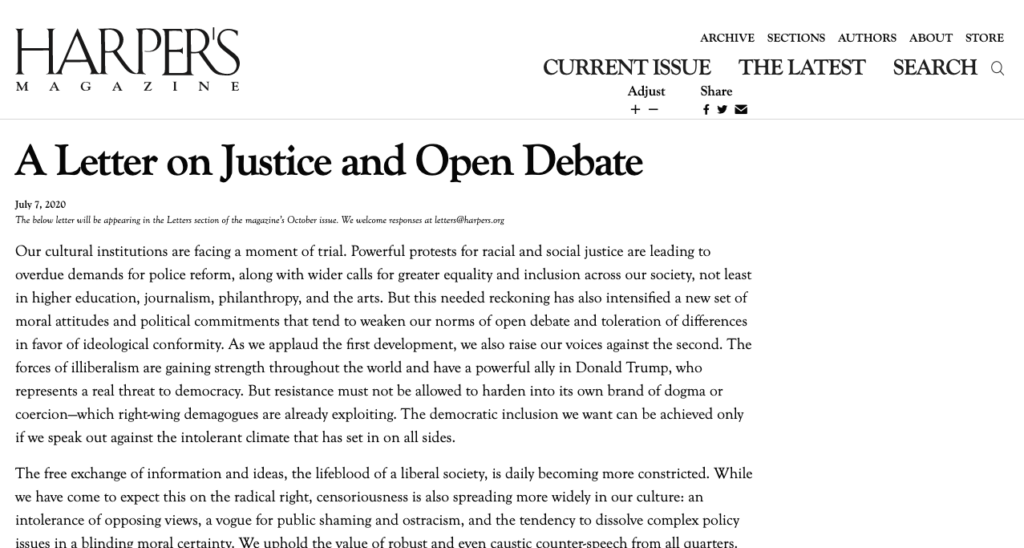Harper’s, New York Times, and Free Speech – What Are The Right Rules For Public Debate?

In July of 2020, Harper’s Magazine published an open letter on “Justice and Open Debate”, signed by over a hundred writers, journalists, and thinkers — including big names such as Salman Rushdie, Margaret Atwood, and JK Rowling.
The letter itself is only three paragraphs long, and speaks mostly in broad strokes, arguing that we as a society must protect the right to discuss any idea, even those we disagree with, and particularly warns against punishing those who raise ideas that are unfashionable or supposedly dangerous with the loss of jobs or reputation.
It goes on to say that even so-called “caustic counter-speech” must be aired and defeated in the public sphere, and a culture of limiting our freedom to debate them openly can be just as dangerous as the caustic ideas themselves.
The argument itself is so unspecific, it’s sort of hard to argue against on principle. “Free speech, we like it!”
But the response has shown that’s exactly the problem: in making such a broad argument, it comes off as naive and totally unhelpful. In a time where people without a voice are finding it in new ways, it feels out of touch. As a veiled swipe against “cancel culture” it seems to miss the point that free speech is exactly what’s being deployed, finally, to hold powerful people and gatekeepers to account for their words and actions.
That in reality, “cancel culture” should more honestly be thought of as “consequence culture”. Sometimes when you use your freedom to say things, everyone else uses their freedom to say you’re out of line.
This all comes just weeks after another Big Internet Discussion that sprung up following an editorial, written by Senator Tom Cotton and published in the New York Times Opinion section, arguing for the deployment of the military against protestors.
In the blowback that followed, editor James Bennet resigned from the Times. He was not fired, fined or punished. But he did resign, probably under pressure. Which is important to the ensuing discussion around whether consequences like this are ultimately damaging to free speech in a broader sense.
In an interview with WNYC’s On The Media, Vox writer David Roberts discussed his response, in which he outlines how the farthest right thinkers are no longer operating within the bounds of good faith debate, particularly when it comes to free speech. (See video for excerpt.)
This is a helpful distinction: when we’re talking about what speech is “acceptable,” we aren’t usually talking about the concept of free speech in an absolute sense. We’re more often talking about which ideas get the benefit of certain platforms to amplify them.
Think of two extremes: in one world, everyone gets their own prime-time TV show. That’s crazy and impossible, because there aren’t time slots and studio spaces to make that real. Someone, somewhere, has to choose.
On another extreme: a guy in a park screaming that all left-handed people are witches who should be shot into the sun. Now, this guy is just a guy, given no resources or platform by anyone. But even so, if he did this day after day, his community would probably choose to keep him out of that park, eventually. His crazy, violent speech is baseless, disruptive, and harmful to the public good.
Neither extreme is realistic, but illustrates that either extreme is not the real point: not everyone gets unfettered access to a large audience, and not every idea is up for good faith discussion in public.
So what we’re really talking about are the basic rules we agree upon for public debate. And under those rules, for example, we might decide that lying conspiracy peddlers don’t get to have Twitter accounts because they spread misinformation, which hurts everyone. Or that White Supremacists aren’t appropriate to interview on live TV because their fundamental position runs counter to our shared ideals of equality, and so at their very core, they don’t deserve unfiltered distribution.
And especially when we’re talking about publication or broadcast, we can’t forget all the ideas that never get their turn on the stage to begin with, because the powers behind those platforms traditionally favor certain views or voices.
So, maybe it’s time to consider what the world could be like if there were a core set of principles that outline what’s suitable for public debate — either basic requirements, or possibly a few select restrictions.